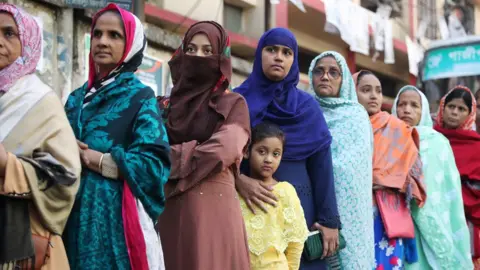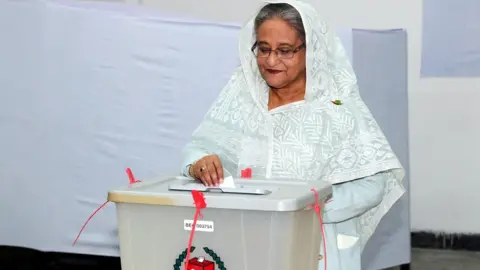Bangladesh election: PM Sheikh Hasina wins landslide in disputed vote
Prime Minister Sheikh Hasina has secured her third consecutive term with a landslide victory in Bangladesh's national election.
Her party and its allies won almost all of the 300 parliamentary seats contested, in its best ever result.
But the opposition alliance, which won just seven seats, condemned the vote as "farcical", marred by violence, intimidation and vote rigging claims.
Election authorities said there could be no re-run.
Although the election commission earlier said it had heard vote-rigging allegations from "across the country" and would investigate, the commissioner said voting had been held in a peaceful manner and hence there would be no new vote.
Bangladesh's parliament has 350 seats in total, 50 of which are reserved for women and allotted proportional to the overall vote.
"We urge the election commission to void this farcical result immediately," opposition leader Kamal Hossain said on Sunday.
"We are demanding that a fresh election is held under a neutral government as early as possible."
At least 17 people have been killed in clashes between ruling party supporters and the opposition.
What are the allegations?
Sheikh Hasina's Awami League has run Bangladesh since 2009 and won 288 seats in this election. But one of the leading opposition parties has accused it of using stuffed ballot boxes.
A spokesman for the Bangladesh National Party (BNP) alleged there were "irregularities" in 221 of the 300 seats being contested.
Soon before polls opened, a BBC correspondent saw filled ballot boxes at a polling centre in the port city of Chittagong. The presiding officer declined to comment.
Only ruling party polling agents were present at that and several other polling centres in the second-largest city of the country.
 Reuters
ReutersHuman Rights Watch South Asia director Meenakshi Ganguly said on Twitter that "with serious allegations of voter intimidation, restrictions on opposition polling agents and several candidates seeking a re-poll, there are concerns about the credibility" of the election.
At least 47 candidates from the main opposition alliance withdrew before polling closed, alleging vote rigging and intimidation.
Activists, observers and the opposition party had warned that the vote would not be fair, but the governing party accused the opposition of peddling false claims.
Ms Hasina told the BBC on Friday: "On the one hand, they are placing allegations. On the other hand, they are attacking our party workers, leaders. That is the tragedy in this country."
At polling booths on Sunday, the BBC's Yogita Limaye found that Ms Hasina's supporters were vocal and happy to answer questions on camera, while other voters were mostly too scared to speak out.
Dozens of workers from the PM's party were outside polling stations, while no-one from opposition parties was visible.
One man said that several members of his extended family found that their votes had already been cast when they went to the polling booth.
Why was this election important?
Bangladesh is a Muslim-majority nation of more than 160 million people and faces issues ranging from possibly devastating climate change, Islamist militancy, endemic poverty and corruption.
The country has recently been in the international spotlight as hundreds of thousands of Rohingya Muslims have fled there from neighbouring Myanmar.
 Reuters
ReutersThe lead-up to the election saw violence between rival supporters and a crackdown on dissent by a government that critics say has only grown more authoritarian during its 10 years in power.
Sheikh Hasina's Awami League (AL) is however credited with overseeing rapid economic growth and social development, especially in rural areas.
Bangladesh has emerged as the world's second-largest garment exporter, after China.
Who were the contenders?
Sheikh Hasina's long-term rival, Khaleda Zia, was sent to prison on corruption charges earlier this year and barred from competing in the vote, in a case which she claimed was politically motivated.
In Ms Zia's absence, Kamal Hossain, who was previously both an AL minister and Hasina ally, leads the main opposition grouping, the Jatiya Oikya Front, which includes Ms Zia's Bangladesh National Party (BNP).
However, the 81-year-old lawyer, who drew up the country's constitution, did not stand in the election.
The BNP boycotted the last vote in 2014, making Sunday's poll the first to involve all the major parties in 10 years.

